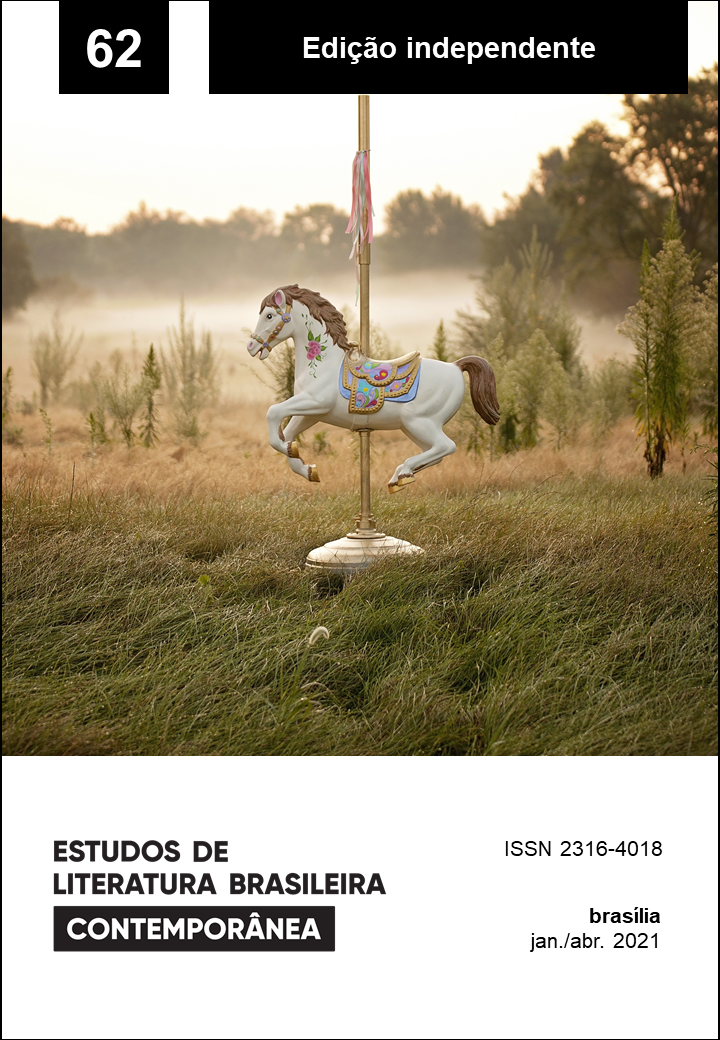“What Makes Us Human”: Everyday Life and Female Afro-Brazilian Resistance in Allan da Rosa’s Reza de mãe
DOI:
https://doi.org/10.1590/2316-40186212Keywords:
Afro-Brazilian women, everyday life, resistance, Allan da RosaAbstract
In her article “Doente de Brasil” (2019), Eliane Brum reveals how Brazilians have gotten mentally and physically sick due to the increasing socio-political authoritarianism since 2016 and its consolidation with the new president. Brum discusses how to fight this state of affairs that is sickening individuals and the collectivity. Her answer argues for culture as an antidote. Not the culture of elitism, but one “that makes us human”, utilizing the word as a mediator and reestablishing ties to build community. Daily acts of resistance, so recurrent in Afro-Brazilian history, compose one of the thematic areas in Reza de mãe (2016), a short story collection by Allan da Rosa. While the stories revolve around Afro-Brazilians’ harsh everyday life in poor communities in São Paulo, two short stories address the female reappropriation of everyday life not only as a means of resistance, but also as a search for that which “makes us human”. Given this context, this article dialogues with the theory developed by Michel de Certeau in The Practice of Everyday Life (1980) to analyze the Afro-Brazilian female characters in the stories “Pode ligar o chuveiro?” and “Reza de mãe”. By granting central stage to the characters, the stories establish a locus of enunciation in which black and peripheral women become agents of their own story/history. I also raise considerations regarding the formative role of distinct literary genres, as the opening poem “Desculpa perguntar” and the apologue “O barco” provide a thematic frame for addressing oppression and resistance.
Downloads
References
ALLAN da Rosa (2018). Literafro, Belo Horizonte, 14 maio. Disponível em: http://www.letras.ufmg.br/literafro/autores/506-allan-da-rosa. Acesso em: 26 jan. 2020.
BICALHO, Gustavo (2018). Cortes abissais e costuras periféricas nos textos de Allan da Rosa. Literafro, Belo Horizonte, 7 fev. Disponível em: http://bit.ly/3bilC6A. Acesso em: 18 jan. 2020.
BRUM, Eliane (2019). Doente de Brasil: como resistir ao adoecimento num país (des)controlado pelo perverso da autoverdade. El País, 2 ago. Disponível em: http://bit.ly/3c0nyjk. Acesso em: 12 out. 2019.
CERTEAU, Michel de (1998). A invenção do cotidiano. Tradução de Ephraim Ferreira Alves. Petrópolis: Vozes.
DALCASTAGNÈ, Regina (2016). Sobre a criação de narrativas necessárias. Pernambuco: Suplemento Cultural do Diário Oficial do Estado, n. 129. Disponível em: http://bit.ly/3bjJg2z. Acesso em: 30 nov.. 2019.
DALCASTAGNÈ, Regina; LICARIÃO, Berttoni; NAKAGOME, Patrícia (Org.) (2018). Literatura e resistência. Porto Alegre: Zouk.
FIGUEIREDO, Fernanda Rodrigues de; RIBEIRO, Glauber Reggiani (2017). Artesanato poético: a valorização da periferia. Literafro, Belo Horizonte, 20 dez. Disponível em: https://bit.ly/30d3Lrw. Acesso em: 20 set. 2019.
GILLIAM, Angela; GILLIAM, Onik’a. (1995). Negociando a subjetividade de mulata no Brasil. Revista Estudos Feministas, Rio de Janeiro, n. 2, p. 525-543. Disponível em: https://bit.ly/3kRRkuO. Acesso em: 12 out. 2019.
GUIMARÃES, Juca (2016). Escritor Allan da Rosa lança livro sobre personagens que “lutam para serem reconhecidos como gente”. Geledés, 17 out. Disponível em: http://bit.ly/3qfLFzL. Acesso em: 20 set. 2019.
LIMA, Cláudia Castro (2008). Nefertiti: uma deusa no comando. Aventuras na História. Disponível em: http://bit.ly/3sKwyQq Acesso em: 24 jan. 2020.
MONGIM, Luciana Marquesini (2018). O corpo negro periférico e a poética gingadeira no livro Reza de mãe, de Allan da Rosa. In: CONGRESSO INTERNACIONAL AFRICANIDADES E BRASILIDADES, 2., SEMINÁRIO ACOLHENDO AS LÍNGUAS AFRICANAS, 7., CONGRESSO NACIONAL AFRICANIDADES E BRASILIDADES, 4., 17 a 20 set. 2018, Vitória. Anais [...] Vitória: Nafricab/UFES. Disponível em: http://periodicos.ufes.br/cnafricab/article/view/21866. Acesso em: 12 out. 2019.
OLIVEIRA, Eduardo (2009). Epistemologia da ancestralidade. Entrelugares – Revista de Sociopoética e Abordagens Afins, v. 1, p. 1-10. Disponível em: https://bit.ly/3c48ots. Acesso em: 14 nov. 2019.
OLIVEIRA, Emanuelle K. F. (2008). Writing Identity: the Politics of Contemporary Afro-Brazilian Literature. West Lafayette, Indiana: Purdue.
PATROCÍNIO, Paulo Roberto Tonani do (2011). Allan Santos da Rosa: um outro olhar sobre a periferia. Ipotesi, Juiz de Fora, v. 15, n. 2, especial, p. 57-69, jul./dez. Disponível em: https://bit.ly/38g29lf. Acesso em: 12 out. 2019.
ROSA, Allan da (2016a). Escritor Allan da Rosa lança livro sobre personagens que “lutam para serem reconhecidos como gente”. [Entrevista a] Juca Guimarães. Geledés, 17 out. Disponível em: http://bit.ly/2O6wQlN /. Acesso em: 22 set.. 2019.
ROSA, Allan da (2016b). Reza de mãe. São Paulo: Nós.
TENNINA, Lucía (2017). Cuidado com os poetas! Literatura e periferia na cidade de São Paulo. Porto Alegre: Zouk. (Coleção Estudos de Literaturas Contemporâneas).
Downloads
Published
How to Cite
Issue
Section
License
Copyright (c) 2021 Cecília Paiva Ximenes Rodrigues

This work is licensed under a Creative Commons Attribution-NoDerivatives 4.0 International License.
Authors who publish in this journal agree to the following terms:
a) The authors maintain the copyright and grant the journal the right of first publication, the work being simultaneously licensed under the Creative Commons Attribution License-Non Commercial 4.0 which allows the sharing of the work with acknowledgment of the authorship of the work and publication this journal.
b) Authors are authorized to enter into additional contracts separately, for non-exclusive distribution of the version of the work published in this journal (eg publish in institutional repository or as a book chapter), with authorship recognition and publication in this journal.
c) Authors are allowed and encouraged to publish and distribute their work online (eg in institutional repositories or on their personal page) after the editorial process, as this can generate productive changes, as well as increase the impact and citation of published work (See The Effect of Free Access).
d) The authors of the approved works authorize the magazine to, after publication, transfer its content for reproduction in content crawlers, virtual libraries and the like.
e) The authors assume that the texts submitted to the publication are of their original creation, being fully responsible for their content in the event of possible opposition by third parties.


